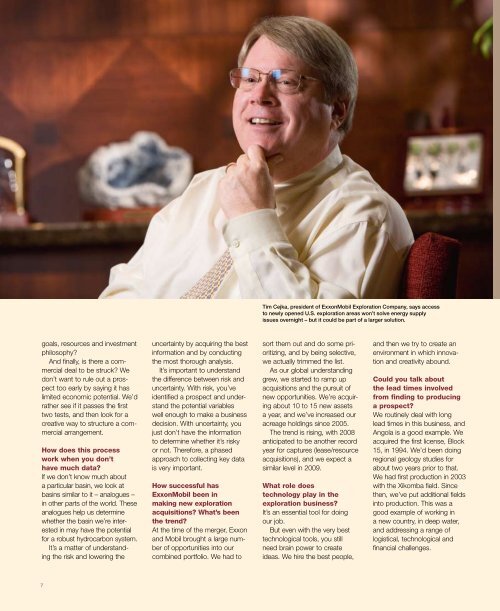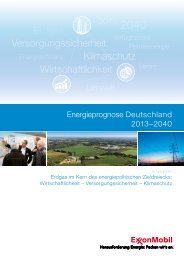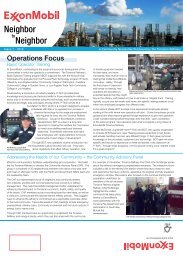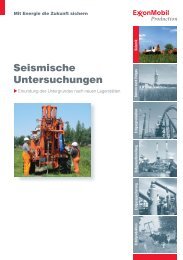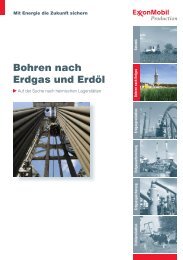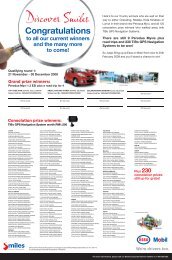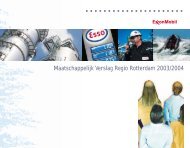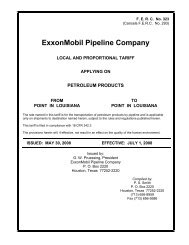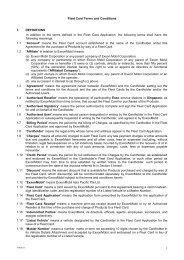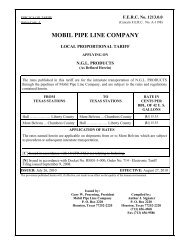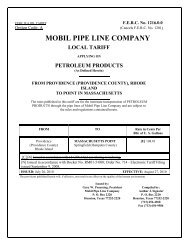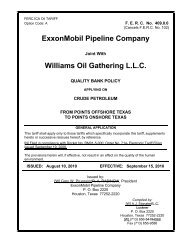Number 4 - ExxonMobil in the UK
Number 4 - ExxonMobil in the UK
Number 4 - ExxonMobil in the UK
You also want an ePaper? Increase the reach of your titles
YUMPU automatically turns print PDFs into web optimized ePapers that Google loves.
goals, resources and <strong>in</strong>vestment<br />
philosophy?<br />
And f<strong>in</strong>ally, is <strong>the</strong>re a commercial<br />
deal to be struck? We<br />
don’t want to rule out a prospect<br />
too early by say<strong>in</strong>g it has<br />
limited economic potential. We’d<br />
ra<strong>the</strong>r see if it passes <strong>the</strong> first<br />
two tests, and <strong>the</strong>n look for a<br />
creative way to structure a commercial<br />
arrangement.<br />
How does this process<br />
work when you don’t<br />
have much data?<br />
If we don’t know much about<br />
a particular bas<strong>in</strong>, we look at<br />
bas<strong>in</strong>s similar to it – analogues –<br />
<strong>in</strong> o<strong>the</strong>r parts of <strong>the</strong> world. These<br />
analogues help us determ<strong>in</strong>e<br />
whe<strong>the</strong>r <strong>the</strong> bas<strong>in</strong> we’re <strong>in</strong>terested<br />
<strong>in</strong> may have <strong>the</strong> potential<br />
for a robust hydrocarbon system.<br />
It’s a matter of understand<strong>in</strong>g<br />
<strong>the</strong> risk and lower<strong>in</strong>g <strong>the</strong><br />
7<br />
uncerta<strong>in</strong>ty by acquir<strong>in</strong>g <strong>the</strong> best<br />
<strong>in</strong>formation and by conduct<strong>in</strong>g<br />
<strong>the</strong> most thorough analysis.<br />
It’s important to understand<br />
<strong>the</strong> difference between risk and<br />
uncerta<strong>in</strong>ty. With risk, you’ve<br />
identified a prospect and understand<br />
<strong>the</strong> potential variables<br />
well enough to make a bus<strong>in</strong>ess<br />
decision. With uncerta<strong>in</strong>ty, you<br />
just don’t have <strong>the</strong> <strong>in</strong>formation<br />
to determ<strong>in</strong>e whe<strong>the</strong>r it’s risky<br />
or not. Therefore, a phased<br />
approach to collect<strong>in</strong>g key data<br />
is very important.<br />
How successful has<br />
<strong>ExxonMobil</strong> been <strong>in</strong><br />
mak<strong>in</strong>g new exploration<br />
acquisitions? What’s been<br />
<strong>the</strong> trend?<br />
At <strong>the</strong> time of <strong>the</strong> merger, Exxon<br />
and Mobil brought a large number<br />
of opportunities <strong>in</strong>to our<br />
comb<strong>in</strong>ed portfolio. We had to<br />
Tim Cejka, president of <strong>ExxonMobil</strong> Exploration Company, says access<br />
to newly opened U.S. exploration areas won’t solve energy supply<br />
issues overnight – but it could be part of a larger solution.<br />
sort <strong>the</strong>m out and do some prioritiz<strong>in</strong>g,<br />
and by be<strong>in</strong>g selective,<br />
we actually trimmed <strong>the</strong> list.<br />
As our global understand<strong>in</strong>g<br />
grew, we started to ramp up<br />
acquisitions and <strong>the</strong> pursuit of<br />
new opportunities. We’re acquir<strong>in</strong>g<br />
about 10 to 15 new assets<br />
a year, and we’ve <strong>in</strong>creased our<br />
acreage hold<strong>in</strong>gs s<strong>in</strong>ce 2005.<br />
The trend is ris<strong>in</strong>g, with 2008<br />
anticipated to be ano<strong>the</strong>r record<br />
year for captures (lease/resource<br />
acquisitions), and we expect a<br />
similar level <strong>in</strong> 2009.<br />
What role does<br />
technology play <strong>in</strong> <strong>the</strong><br />
exploration bus<strong>in</strong>ess?<br />
It’s an essential tool for do<strong>in</strong>g<br />
our job.<br />
But even with <strong>the</strong> very best<br />
technological tools, you still<br />
need bra<strong>in</strong> power to create<br />
ideas. We hire <strong>the</strong> best people,<br />
and <strong>the</strong>n we try to create an<br />
environment <strong>in</strong> which <strong>in</strong>novation<br />
and creativity abound.<br />
Could you talk about<br />
<strong>the</strong> lead times <strong>in</strong>volved<br />
from f<strong>in</strong>d<strong>in</strong>g to produc<strong>in</strong>g<br />
a prospect?<br />
We rout<strong>in</strong>ely deal with long<br />
lead times <strong>in</strong> this bus<strong>in</strong>ess, and<br />
Angola is a good example. We<br />
acquired <strong>the</strong> first license, Block<br />
15, <strong>in</strong> 1994. We’d been do<strong>in</strong>g<br />
regional geology studies for<br />
about two years prior to that.<br />
We had first production <strong>in</strong> 2003<br />
with <strong>the</strong> Xikomba field. S<strong>in</strong>ce<br />
<strong>the</strong>n, we’ve put additional fields<br />
<strong>in</strong>to production. This was a<br />
good example of work<strong>in</strong>g <strong>in</strong><br />
a new country, <strong>in</strong> deep water,<br />
and address<strong>in</strong>g a range of<br />
logistical, technological and<br />
f<strong>in</strong>ancial challenges.


